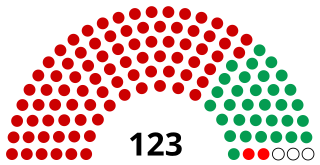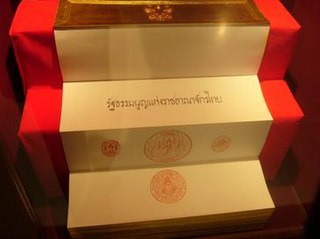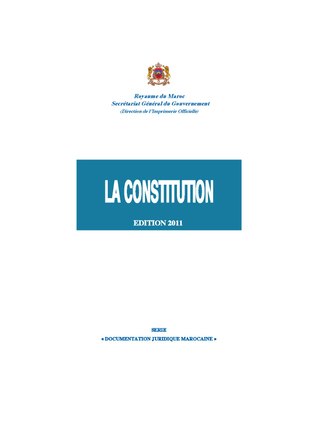
The Riigikogu is the unicameral parliament of Estonia. In addition to approving legislation, the Parliament appoints high officials, including the Prime Minister and Chief Justice of the Supreme Court, and elects the President. Among its other tasks, the Riigikogu also ratifies significant foreign treaties that impose military and proprietary obligations and bring about changes in law, as well as approves the budget presented by the government as law, and monitors the executive power.

This is a list of referendums related to the European Union, or referendums related to the European Communities, which were predecessors of the European Union. Since 1972, a total of 48 referendums have been held by EU member states, candidate states, and their territories, with several additional referendums held in countries outside the EU. The referendums have been held most commonly on the subject of whether to become a member of European Union as part of the accession process, although the EU does not require any candidate country to hold a referendum to approve membership or as part of treaty ratification. Other EU-related referendums have been held on the adoption of the euro and on participation in other EU-related policies.

Elections in Niger take place within the framework of a semi-presidential system. The President and National Assembly are elected by the public, with elections organised by the Independent National Electoral Commission (CENI).

The National Assembly is the lower chamber of Parliament in Burundi. It consists of 100 directly elected members and between 18 and 23 co-opted members who serve five-year terms.

The position of vice-president of the Republic of Burundi was created in June 1998, when a transitional constitution went into effect. It replaced the post of Prime Minister.

A constitutional referendum was held in Burundi on 9 March 1992. It followed the 1991 referendum on the Charter of National Unity, which gave the government a mandate to draw up a new constitution. The resulting document created a presidential republic with unlimited five-year term for candidates, introduced proportional representation as the method for electing the Parliament, guaranteed freedom of the press and human rights, and the requirement for registered political parties to accept the Charter of National Unity.

The electorate of Iraq went to the polls on 15 October 2005 to vote in a referendum on whether or not to ratify the proposed constitution of Iraq. After 10 days of counting votes, the country's electoral commission announced that the constitution had been approved by a wide margin nationwide. A number of mainly Sunni critics like future deputy prime minister Saleh al-Mutlaq alleged massive irregularities, saying that soldiers broke in to polling stations and changed votes to yes in the crucial province of Nineveh, which was expected by them to provide the third "no" vote.
This electoral calendar 2005 lists the national/federal direct elections held in 2005 in the de jure and de facto sovereign states and their dependent territories. Referendums are included, although they are not elections. By-elections are not included.

The Constitution of the Kingdom of Thailand, Buddhist Era 2550 (2007) was the constitution of Thailand which was in effect from 2007 to 2014.

A constitutional referendum was held in Burundi on 28 February 2005. The new constitution was approved by 92% of voters.

A referendum on the new constitution was held in Thailand on 19 August 2007. Had the draft been rejected, the military government would have had the freedom to choose any previous constitution to adapt and promulgate instead. The turnout was around 60%.

The 1992 Constitution of Mali was approved by a referendum on 12 January 1992 after being drawn up by a national conference in August 1991. The constitution provides for multi party democracy within a semi-presidential system.

The Gibraltar Constitution Order 2006 was taken to a referendum in Gibraltar on 30 November 2006. A coalition of groups opposing the proposal held that a majority of 60% should be required to give effect to a new Constitution, quoting other instances, but the political parties held that the result should be decided by a simple majority in favour of the new constitution. The constitution was approved by 60% of the votes anyway.

The Constitution of Morocco is the supreme law of the Kingdom of Morocco. The constitution defines Morocco as a constitutional monarchy and lays out the fundamental rights of Moroccan citizens, it also defines the basis and structures of government, the council of ministers, and the parliament.

A referendum on a new constitution was held in Puerto Rico on 3 March 1952. It was approved by 81.9% of voters. This was considered by many U.S. and Puerto Rican politicians an affirmation of the new constitution of the island as an Estado Libre Associado, or Commonwealth, as proposed by legislation in 1950 by the United States Congress after negotiation with its political leaders. Puerto Rican nationalists question the meaning of the referendum, complaining that the only alternative offered was direct U.S. rule, and no choice of independence was offered. In 1980, the Supreme Court of the United States adjudicated that as a result of this referendum of 1952, the actual territorial status was not changed at all.
A referendum on a new constitution and citizenship was held in Estonia on 28 June 1992. Voters were asked whether they approved of the new constitution drawn up by the Constitutional Assembly and extending suffrage to people registered as citizens. The new constitution was approved by 91.9% of voters, whilst the suffrage extension was rejected by 53.5%. Voter turnout was 66.8% for the constitution question and 66.7% for the suffrage question.
A referendum is a direct vote in which an entire electorate is asked to either accept or reject a particular proposal. This article summarises referendum laws and practice in various countries.

A constitutional referendum was held in Thailand on 7 August 2016. The charter offered only semi-democracy and was seen to tighten military rule in Thailand. However, it was approved by 61% of voters with a 59% turnout. A second proposal for the next prime minister to be jointly elected by senators and MPs was also approved. However, the opposition groups to the constitution were barred from formally campaigning against it by the military government, while the military government actively campaigned for its adoption.

A constitutional referendum was held in Burundi on 17 May 2018. The proposed amendments to the constitution were approved by over 70% of voters.
Referendums in the Philippines are occasionally held at a national, regional or local level. Referendums can either by national or local in scope. In the Philippines, "referendums" and "plebiscites" mean different things.













